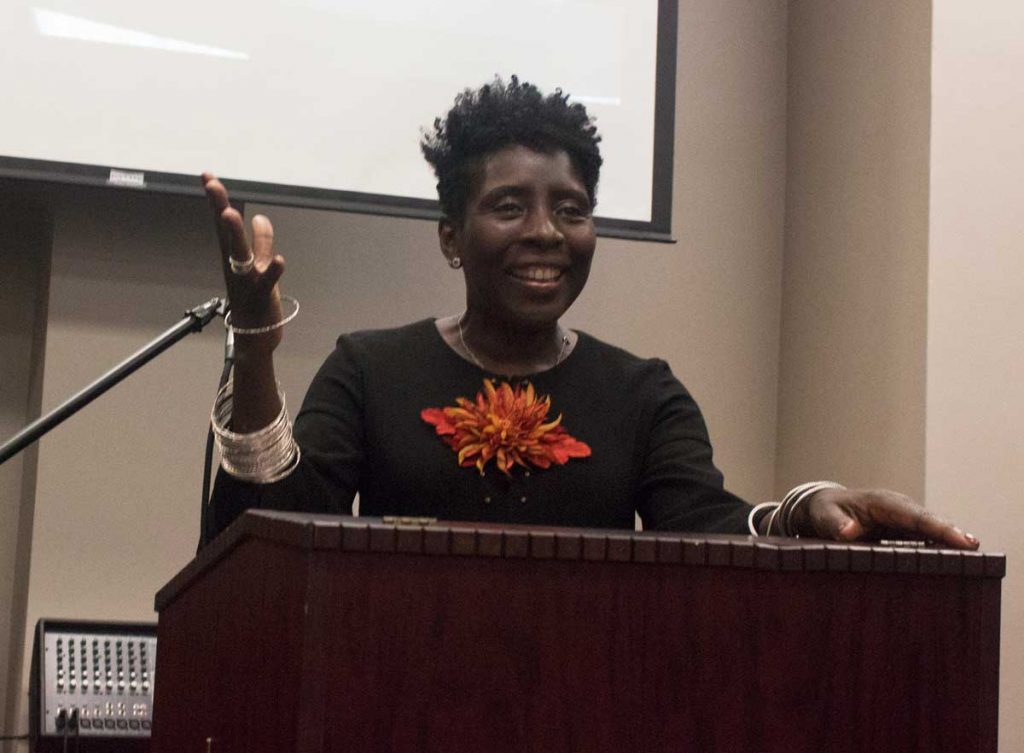
Pamela Junior, director of the Mississippi Civil Rights Museum, speaks in the library on campus today. Photo by Chase Roberts
“I’m gonna keep on a-walkin’, keep on a-talkin’, marchin’ down to freedom land,” Pamela D.C. Junior, director of the first state-sponsored civil rights museum in the nation, sang to the audience gathered at the library Thursday afternoon.
“Do you realize that you are a light?” Junior asked the crowd. “Lights came into the state of Mississippi — black, white, yellow — to change Mississippi, and they did, so your lights can do the same thing. Your lights can come together as one and make the state of Mississippi the greatest place to live.”
Junior’s goal is that the Mississippi Civil Rights Museum, opening this December in Jackson, will not only illuminate historic truth and tell the stories of the bright lights who persevered, fought and changed the state and country forever, but will also inspire spectators to unearth their own inner lights and set out on the path toward progress in Mississippi.
Junior said the “Two Mississippi Museums” initiative idea, which also includes the Museum of Mississippi History, emerged about 10 years ago. Since then, the Mississippi Legislature and the Foundation for Mississippi History raised $90 million to fund this 200,000-square-foot center that stores more than 22,000 artifacts.
Junior held a 17-yearlong position as manager of the Smith Robertson Museum and Cultural Center and is a board member for the Mississippi Delta National Heritage Area and Mississippi Book Festival. She describes herself as a “little shy girl in west Jackson.”
Junior attributes her success to her ancestors, who were among the 3,000 people who came to America in the slave trade. She wears dangly, clinking bracelets to remind her that everything she does is for her fearless predecessors.
“If they could make it over on this ship, if they could go to a store counter and take all that they took, well, little old me, I got to get up in the morning and always be the best that I can be,” Junior said. “What is your excuse?”
The museum consists of eight galleries, beginning with a timeline of the transatlantic slave trade and slave life on cotton plantations, then moving on to the Emancipation Proclamation.
Junior said that in this section of the museum, people may need to catch their breath because the images will be brutal — the exhibit will show the realities of the lynching and Jim Crow laws.
“We ain’t playing with you. The governor said there may be some things that you might not like,” Junior said. “But it’s meant to tell a comprehensive history of Mississippi. Mississippi is finally going to tell the truth.”
The third gallery, “This Little Light of Mine,” the one closest to Junior’s heart, gives viewers a break from the wickedness they just experienced in the first two exhibits.
“This great big space will have a 37-foot sculpture entangled with lights, and as more people walk in, the lights start dancing and moving, and then you’ll hear children sing ‘This Little Light of Mine,’” Junior said. “It’s amazing.”
The fourth gallery includes first-hand accounts of black Mississippians who served in World War II. The fifth explores the 1960s, what activist Bob Moses called the “tremor in the middle of the iceberg.”
The sixth and seventh exhibits, “I Question America” and “Black Empowerment” explore how local movements grew into state campaigns and successes such as the Voting Rights Act of 1965 and the March Against Fear.
Lastly, the museum will ask viewers “Where do we go from here?” and give them an opportunity to write down their thoughts, comments and reflections on how the museum affected them.
“After you’ve gone through one to seven, you’re probably crying. You can’t breathe, and now you need to wake up and ask ‘How can I help?” Junior said. “Until we do this together, we will always be 50th in education, economics, everything. It’s time for a change.”
Laura Wilson, an English Ph.D. student, said she was holding back tears for a lot of the lecture.
“There’s too much willful ignorance and many incomplete histories, so a museum like this will tell the full story,” Wilson said.
Greg Johnson, the blues curator of the university library’s Archives and Special Collections, said the department was happy to provide the Jackson museum with scans of images from its collections.
“It’s so important for our state to acknowledge the wrongs that we’ve done,” Johnson said. “We need to be confronted with evil because it allows us to move on.”
Tickets to the opening reception are free to reserve on the Mississippi Civil Rights Museum website.
Paige Williams contributed reporting to this article.






